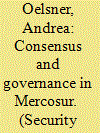|
|
|
Sort Order |
|
|
|
Items / Page
|
|
|
|
|
|
|
| Srl | Item |
| 1 |
ID:
087454


|
|
|
|
|
| Publication |
2009.
|
| Summary/Abstract |
This article constitutes a first exploration of the security governance of Mercosur, the common market of Latin America's Southern Cone. Drawing on securitization theory, the article argues that three major clusters of security issues have consecutively become the focus of the region's security agenda. First, prior to Mercosur's foundation and during the various processes of democratization in the region, the success of democratic transitions, the stabilization of civil-military relations and the region's insertion into the world economy were successfully securitized. At a second stage, more traditional issues associated with the use of military force gained centrality in the security agenda. Finally, and particularly since 11 September 2001, the region's security architecture was redesigned to accommodate `new' security threats. Around the consensuses on these three issue-clusters, formal and informal structures of policy coordination have emerged, constituting a limited system of governance. Yet, though regional governance is admittedly weak, this article contends that the security consensuses and the emerging institutional structures that have ensued are contributing to forging a shared normativity in the Mercosur area.
|
|
|
|
|
|
|
|
|
|
|
|
|
|
|
|
| 2 |
ID:
101840


|
|
|
|
|
| Publication |
2011.
|
| Summary/Abstract |
The role of international friendship in regional integration - be it as one of encouraging integration or as its by-product - tends to be overshadowed by (realist) assumptions of naked self-interest. This article aims to open up a space for friendship in the study of regional integration, by exploring the structuration of a series of speech acts and institutional facts that can be interpreted as signs of engagement in, and proofs of, friendship. In doing this, it puts forward a new analytical perspective and methodological framework. The case studies chosen to illustrate the analysis - the Franco-German and the Argentine-Brazilian dyads - reflect the historical meaning of the experience of moving away from enmity/antagonism towards building relationships based on mutual trust, which put these dyads at the centre of regional integration processes.
|
|
|
|
|
|
|
|
|
|
|
|
|
|
|
|
| 3 |
ID:
119645


|
|
|
|
|
| Publication |
2013.
|
| Summary/Abstract |
In the last 15 years, the link between identity and regional institutions has received considerable academic attention, especially from EU scholars. Mostly, their focus has been on the ways in which European institutions affect, constrain, or constitute (or otherwise) state's and individual actor's behavior and identities. By contrast, international relations has been strikingly silent on the question of the identity of regional institutions. However, studying an institution's identity can highlight important aspects of its "quality of life"; not least its ability to interact with other international actors and with its own constituent parts. This article argues that a clear identity is necessary for the organization to project itself internally, internationally, and temporally. The question of institutional identity-and the risks of failing to construct one-is explored by looking at the case of Mercosur, an association which, the article argues, suffers from identity crises in its three main identity dimension: political, economic and external.
|
|
|
|
|
|
|
|
|
|
|
|
|
|
|
|
|
|
|
|
|